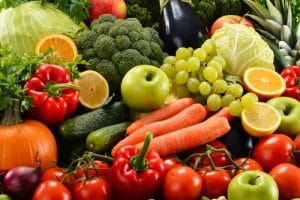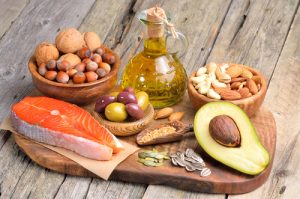Unfortunately, many people struggle to create the family they’ve always dreamed of. Despite popular belief, men play a third of the role in the inability to conceive. Regardless of which party is responsible, a series of negative pregnancy tests is a hard pill to swallow. Luckily, there are natural ways to improve your chances of conception. One of the easiest ways is with a change in diet. When you eat unhealthy foods, you put on excess weight and hinder the fertility process. If you’re on the path to figuring out the best diet for yourself, here are some foods to add to your fertility-friendly diet.
Fertility-Friendly Diet Dos and Don’ts
Medical professionals and nutritional experts suggest those struggling with fertility adopt some healthy dietary practices when looking to boost fertility as a proper diet can help with conception. Some tips that are included in these guidelines are as follows:

Examples of baby-making produce include:
- Berries (raspberries, blueberries and strawberries)
- Pomegranates
- Leafy greens (kale, Swiss chard and broccoli)
- Oranges
The intake of specific vitamins and minerals is also believed to be essential for improved fertility, particularly in strengthening sperm quality in men. Nutritionists and fertility experts recommend that would-be parents increase consumption of foods containing folic acid, zinc and vitamins C and E.
For optimal health, women need sufficient iron levels before and during pregnancy. If you don’t want to take supplements, adding iron-rich foods is a good addition to your fertility-friendly diet. Studies show that women who have sufficient iron levels have healthier eggs, increasing their chances of conception.
There are two types of iron absorbed through foods: heme and non-heme. Heme iron comes from poultry and meat sources and is easier to absorb. Non-heme iron comes from plants. Foods with high iron content include the following:
- Lean, organic chicken, fish and beef (be sure to eat red meat in moderation)
- Spinach
- Beans
- Iron-fortified foods (cereals, pasta and rice)
- Dried fruit

- Fish (salmon, trout or tuna)
- Flax seeds
- Sunflower seeds
- Oils (corn, soybean or safflower)
Protein is necessary to build muscle strength and energy. Meat is a good source of protein. However, fertility experts suggest limiting one’s consumption of more fatty meats like beef. Products like poultry, pork and especially fish contain less fat and are generally healthier. The consumption of excess fat could stimulate weight gain, which is thought to potentially disrupt hormonal levels. Fluctuating hormonal levels could lead to problems in conceiving.
Water makes up around 70 percent of the human body. For proper bodily function, your body needs to consume water regularly. When you’re dehydrated, your regular functions are impaired, including the ability to conceive.
Many people, especially couples trying to conceive, underestimate the importance of drinking water. In men, not drinking enough water every day leads to lower sperm count as well as thicker sperm. Thicker sperm has a more difficult time swimming to the egg and fertilizing it.
In women, lack of water affects cervical mucus, which interferes with the sperm’s ability to reach the egg. Lack of water also makes cervical mucus acidic. Acidic cervical mucus makes it nearly impossible for the sperm to survive long enough to fertilize the egg.
Health experts suggest drinking half your weight in ounces of water every day. Whether you set an alarm or keep bottles around, this is an important part of your fertility journey.
If you enjoy drinking, it’s best to avoid alcohol during your fertility journey. When you overindulge in alcohol, you interrupt your menstrual cycle, which makes it difficult to track your ovulation. You also gain excess fat, which affects both male and female fertility.
Alcohol also negatively affects organ function, including your reproductive organs. So even if you do conceive, you’ll struggle to maintain a healthy pregnancy. To avoid complications, it’s best to either refrain from alcohol completely or dramatically decrease consumption.
Caffeine is another problem. Both partners should reduce or even cut caffeine intake entirely. Replacing coffee and sodas with water is the best way to go.
Tips for Beginning and Maintaining a Fertility-Friendly Diet
Initiating and, more importantly, sustaining a fertility-stimulating diet may require committing to lifestyle changes. Healthcare professionals suggest specific tips designed to make this transition somewhat easier, which include the following:
- Disclosing Dietary Preferences: Couples are encouraged to disclose fertility-benefitting foods they like and strive to include them in daily meals. Following such a practice might make adhering to a dietary plan more enjoyable and less of a grind.
- Regulating Individual Food Intake: The key to success in any dietary plan is moderation. Those following a fertility-inducing diet are encouraged to consume smaller portions and control their intake of calories.
- Logging Progress: Nutritionists recommend that fertility dieters keep precise records of what they eat and weight loss objectives.
Sample of a Fertility-Friendly Diet
Here’s a sample menu to get you started.
Breakfast – Veggie and cheese omelet
Lunch – Grilled chicken sandwich with steamed broccoli
Dinner – Tofu stir fry with mixed veggies
Nutrition Tip:
Eggs are a healthy source of lean protein, which has also been found to be good for fertility in both men and women. They are also a good option for improving egg health for fertility. Egg yolks, specifically, supply almost all of the egg’s iron, calcium, zinc, vitamin B6, folate, and vitamin B12. In addition, egg yolk is rich in choline, which helps prevent birth defects once conception takes place.
Breakfast – Whole milk yogurt with nuts and/or berries
Lunch – Spinach salad
Dinner – Homemade tacos
Nutrition Tip:
Did you know that consuming whole food is the only source of natural folate?! Leafy greens such as spinach, collard greens and kale contain an excellent supply of folate, the natural form of vitamin B9. Folate helps with many of the body’s biological processes and in leading up to conception, canhelp decrease the risk of birth defects.
Breakfast – Soaked oatmeal
Lunch – Taco salad made from leftovers
Dinner – Meatloaf or hamburger with sweet potato fries
Nutrition Tip:
Oats and grains are considered a slow-carb, they are high-fiber with a low glycemic index and are not highly refined. These types of foods, such as a healthy grain or oatmeal, can help increase ovulatory regularity and improve fertility outcomes.
Breakfast – Scrambled eggs with spinach and/or cheese
Lunch – Grilled chicken salad, include spinach leaves
Dinner – Grilled steak with steamed veggies
Nutrition Tip:
Besides being an excellent source of protein, chicken also contains a special amino acid, L-carnitine, which is necessary for sperm cells to function normally. In addition, chicken is a great source of zinc and iron, both are important building blocks for fertility health and a healthy pregnancy.
Breakfast – Fruit smoothie with whole milk
Lunch – Grilled veggie pizza
Dinner – Grilled salmon with baked potatoes
Nutrition Tip:
With an abundance of omega-3 fatty acids, which help balance your reproductive system and give your health a boost, salmon is rich in protein, and is said to be nearly devoid of the dangerous levels of mercury found in many other types of fish, making it a fertility-boosting all-star!
Breakfast – Whole-grain pancakes with fruit topping
Lunch – Tofu pita pockets
Dinner – Roast chicken with steamed veggies and butter
Nutrition Tip:
Studies have shown that high levels of soy protein may increase menstrual cycle length and decrease FSH and luteinizing hormone levels. But no need to panic! Eating tofu will not make you infertile. Like with many foods, eating in moderation is key for a healthy dietary balance.
Breakfast – fried eggs and whole-wheat toast
Lunch – broccoli cheese soup
Dinner – chicken casserole
Nutrition Tip:
Vegetables are key for a healthy diet, whether you are looking to get pregnant or not, so it’s no surprise that including them in meals is important when trying to boost fertility health. For classic stand by soups such as broccoli cheddar or cream-based soups, if you find yourself struggling with PCOS symptoms, choosing to cut the dairy ingredients in half or completely can allow you to enjoy your favorite soups without the uncomfortable side effects.
Getting pregnant is a life-changing experience. When you and your partner struggle to conceive, it can be devastating. Since diet plays a large role in fertility for both men and women, it’s best to eat healthier foods and avoid anything that can be a hindrance to getting pregnant. By staying hydrated and eating a fertility-friendly diet, you get closer to a successful conception.





